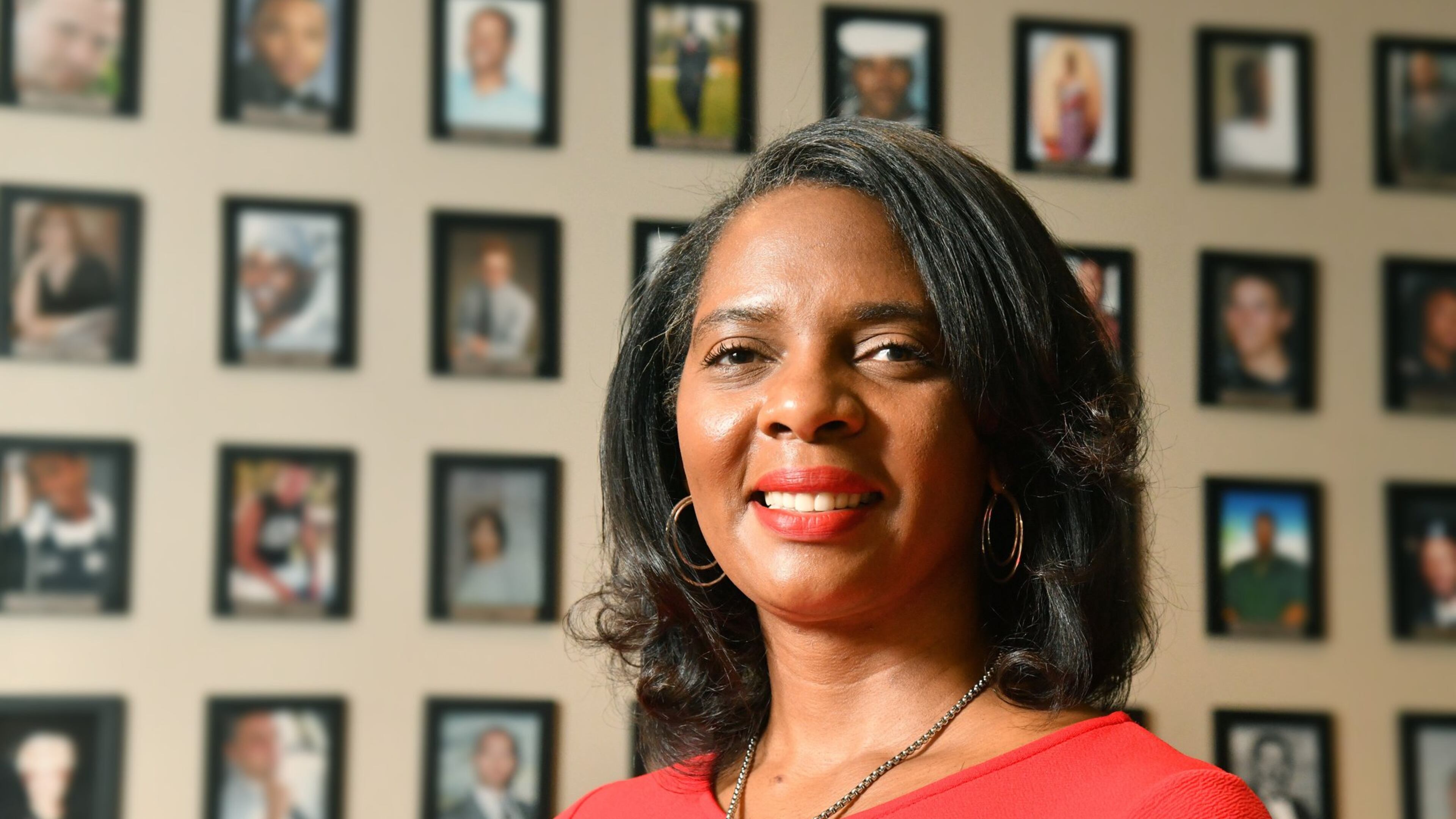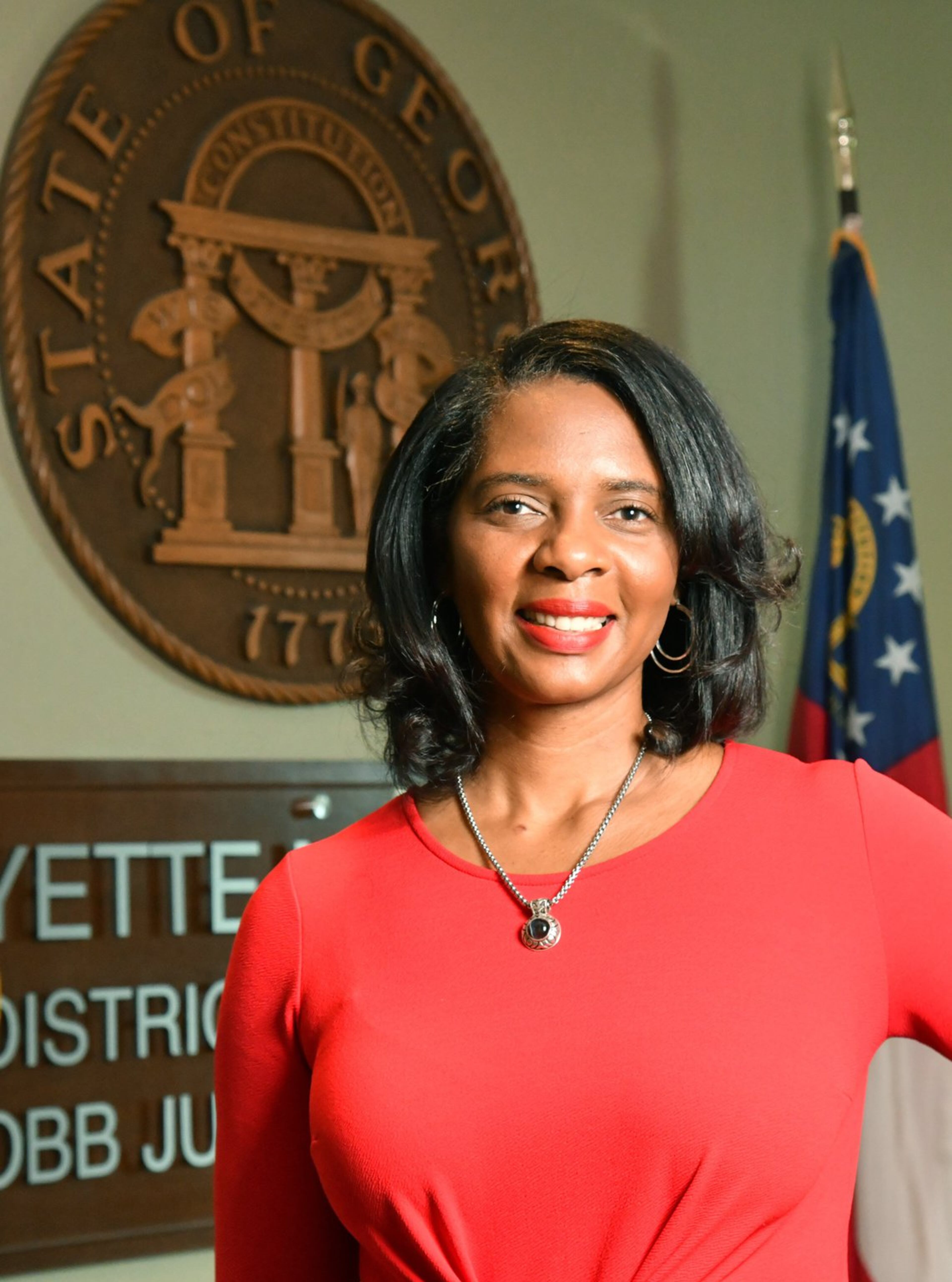‘She’s ready.’ Cobb DA trying Arbery case known for integrity, compassion

As a teenager at Valdosta High School, Joyette Holmes didn’t obsess about the latest hit music, hot movies or the school’s ever-stellar football team. She did watch “Law & Order,” though, and dreamed of becoming part of that team, seeking truth and dispensing justice
“We spent hours talking about how to bring justice and doing the right thing,” said Cedric Mobley, Holmes’ schoolmate at the time. “I think we were probably the weirdest teenagers at that high school.”
Holmes, Cobb County's district attorney for just 10 months, is now known nationwide as the person appointed to lead the prosecution of the father and son charged in the February shooting death of Ahmaud Arbery outside Brunswick. Being thrust into a racially charged case and put in a national spotlight could be intimidating for some, but Holmes has spent decades preparing herself for such a case, say those who know her best.
“I can’t imagine the pressure she’s under, but she’s ready,” said Mobley, now communications director for the AUC Consortium. “The whole arc of her life has brought her to this moment. And I think people are going to see at this time where trust in Georgia is at a low point and the potential for division is high, she is a person who can bring people together to seek the truth.”

Holmes’ friends, as well as lawyers who tried cases against her and appeared before her when she was a judge, describe the 44-year-old district attorney as a person of integrity and compassion, as someone who carefully listens to all sides of a case before making a final decision.
“If somebody was going to investigate me, I’d want it to be her,” said defense attorney John Rife, who faced off against Holmes when she was a prosecutor. “I know I would be treated fairly, for sure. I also know she’ll be extremely thorough and as transparent as anybody you’ll ever see.”
Holmes holds the remarkable distinction of being the fourth district attorney — after two recused themselves citing conflicts and another was replaced — to oversee the Arbery case. On Feb. 23, Gregory McMichael, 64, and Travis McMichael, 34, both of whom were armed, confronted the 25-year-old Arbery in the Satilla Shores neighborhood in Glynn County. A struggle ensued and Arbery, who was unarmed, was shot and killed.
The encounter was captured in a 36-second cellphone video that went viral and led to national outrage.
“Once again, the justice system has failed the black community,” said Christopher Bruce, political director of the ACLU of Georgia. “Over two months passed before charges were brought against two men who gunned down in the street Ahmaud Arbery while he was jogging a few minutes from his home.”
The McMichaels are white and Arbery was African-American.
On May 7, more than two months after the fatal shooting and one day after the GBI opened an investigation, the McMichaels were arrested and charged with murder and aggravated assault. The case has yet to be presented to a grand jury. Most courthouse proceedings have paused due to coronavirus concerns.
Holmes declined a request for an interview. She issued a statement after accepting state Attorney General Chris Carr’s appointment to take on the case.
“Our office will immediately gather all materials related to the investigation thus far and continue to seek additional information to move this case forward,” she said. “We appreciate the confidence that Attorney General Carr has in our office’s ability to bring to light the justice that this case deserves.”
Holmes grew up in a working class neighborhood of Valdosta. In high school, she was a member of the dance team for Valdosta High’s renowned Marching Cats, which performed before thousands at Friday night football games.
Holmes’ late father was a master sergeant, stationed at Moody Air Force near Valdosta. Her mother, who lives with Holmes and her husband and two daughters in Cobb County, is a retired nurse.
In an introductory video posted by the Judicial Council of Georgia, Holmes said she participated in mock trials in high school. “It really excited me and gave me the basis for becoming a lawyer,” she said in the video.
After graduating from the University of Georgia, where she earned dual degrees in psychology and criminal justice, Holmes obtained her law degree from the University of Baltimore School of Law.
After working at the public defender’s office in Baltimore, Homes returned to Georgia. She joined the Solicitor’s Office and then entered private practice as a criminal defense lawyer.
In 2012, she entered the race for an open seat on Cobb County State Court. But her late entry into a four-candidate field likely contributed to a last-place finish with just 12 percent of the vote.
“In not getting that position,” Holmes said on the video, “it caused me to push forward even more.”
Holmes took a job at the Cobb DA’s office as an assistant district attorney where she got more courtroom experience.
Lawrence Zimmerman, president of the Georgia Association of Criminal Defense Lawyers, said he found Holmes to be a good listener who was open to finding a fair outcome, not just a conviction.
Zimmerman cited one case from 2013 in which his client, who had a prior felony, faced multiple drug charges and a DUI. Because of his client’s criminal history, Cobb’s drug court declined to admit him.
Still, Holmes concluded the man’s addiction led to his legal problems, and she agreed to allow him to enter a diversionary drug treatment program after serving 90 days in jail, Zimmerman said.
“She took a chance,” he said. “She didn’t have to. She could have gotten him sent to prison.”
Zimmerman said his client remains clean and is now married with children. The client’s father recently told Zimmerman, “That prosecutor really helped save my son’s life.”
After two and a half years in the DA’s Office, Holmes was encouraged to apply for the newly vacant chief magistrate position. She won that appointment and served four years. Last year, after Gov. Brian Kemp named then-Cobb DA Vic Reynolds to be GBI director, Holmes applied to be the county’s first African-American district attorney.
In the face of strong competition, Holmes, a Republican, got the appointment. This week, Kemp said he's been pleased with his decision.
“Joyette Holmes is a strong leader with impeccable credentials who has done a truly remarkable job as Cobb district attorney,” the governor said. “She personifies the kind of fair, highly respected prosecutor that our state needs right now to uncover the truth and ensure justice is served.”
As Holmes takes on one of the highest-profile cases in the country, she’s also running for election, in November, against a Democrat.
Holmes finds herself in a position similar to that of Angela Corey, the state attorney appointed in 2012 by then-Florida Gov. Rick Scott to head the prosecution of George Zimmerman in the shooting death of Trayvon Martin. Ultimately, Zimmerman was acquitted of all charges, and Corey lost her reelection primary in 2016.
If the McMichaels are ultimately indicted, a trial is not expected this year.
Marietta criminal defense lawyer Scott Halperin said Holmes was the right choice to head the prosecution.
“After she was named, it was 50-50 whether I should call and congratulate her or send condolences,” Halperin said. “Taking on a case like that will require a lot of work in a very contentious environment.”
Still, Halperin said, “I’d be nervous if I were one of the defendants in that case. She is the real deal.”
» CONTINUING COVERAGE: AHMAUD ARBERY DEATH
The Atlanta Journal-Constitution asked the Cobb DA’s office about its ties to the Glynn County DA’s office, where Gregory McMichael once worked as an investigator.
In a statement, the office acknowledged that its prosecution team worked in the Glynn DA’s offices during the 2016 trial of Justin Ross Harris, whose son died after being left in a hot car all day. That trial was moved to Brunswick because of pretrial publicity. During the time, Cobb’s trial team had interactions with McMichael, the statement said. Also, during the following year a former Cobb DA’s Office investigator reached out to McMichael for help locating a witness who lived in Glynn County and was needed to testify in a murder case.
Holmes addressed all that with Carr before accepting the appointment and disclosed them to Arbery’s parents and their legal team, a spokeswoman said.
“In unfortunate circumstances, we are sometimes called upon to prosecute people we know professionally,” Holmes said in a statement. “Professional interactions between prosecuting agencies and even law enforcement are commonplace and do not create a legal or factual conflict in proceeding with a case.”
Over the past decade, Holmes has struck up a relationship with Robert Benham, who recently retired from the state Supreme Court after sitting as an appellate judge for more than 25 years on the bench. In an interview, Benham said he’s a proud mentor and feels good that people like Homes who are dedicated to public service are coming up behind him.
“Here, she’ll face challenges,” Benham said of the Arbery case. “They’ll be controversial. But when you know someone like her is involved — no matter what side, prosecution or defense — you feel like justice is going to be better served.”
Mobley, Holmes’ friend since Valdosta High, agreed.
“She’s going to follow the facts where they lead and she’s going to take us with her,” he said. “That’s what Georgia needs to be prepared for — to find out the truth.”

Staff writer Alexis Stevens contributed to this article.


